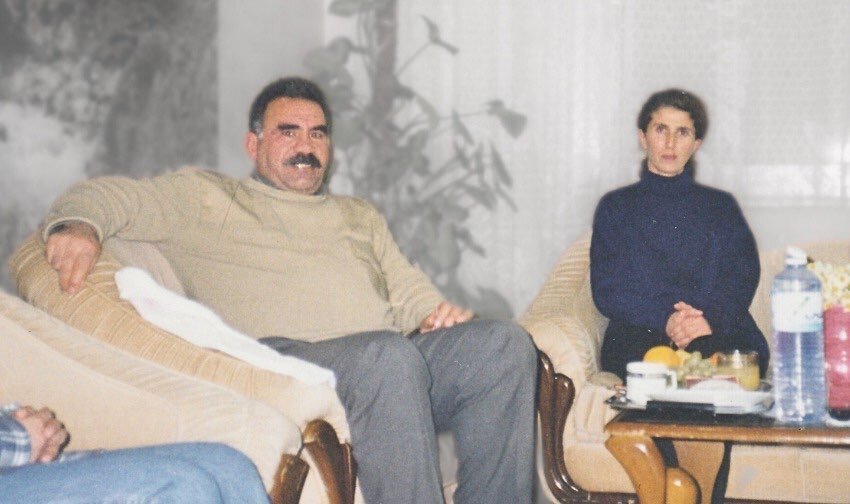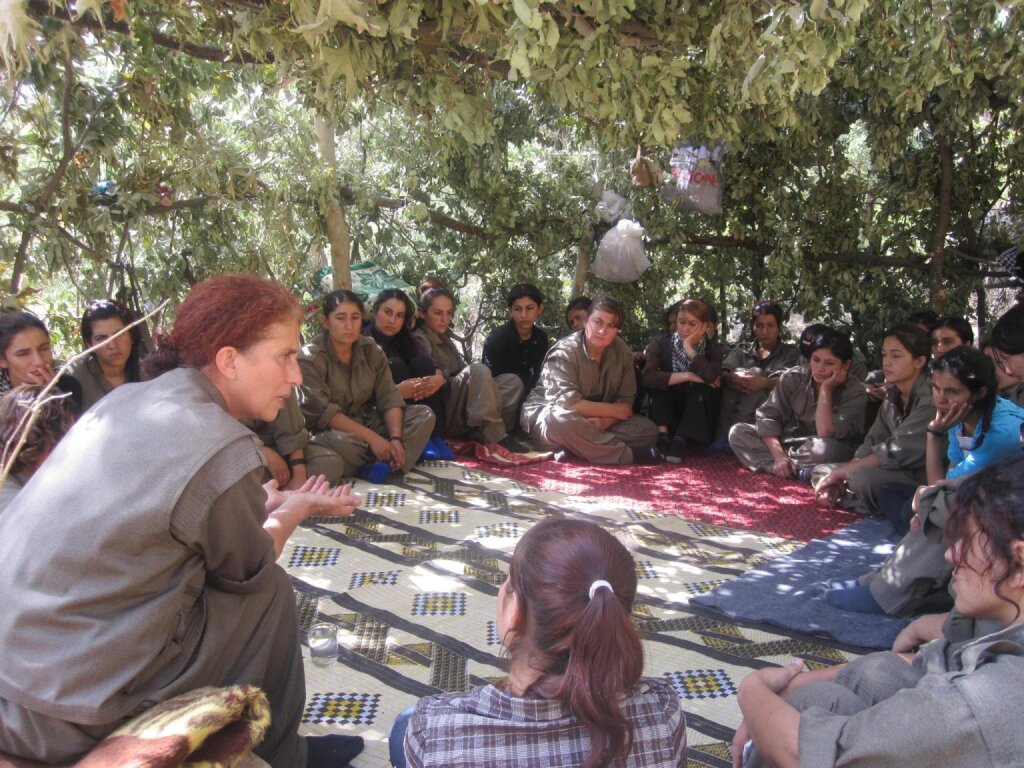Since the international conspiracy who lead to the kidnapping of Rêber APO (Abdullah Öcalan) in 1999, the 4th of April became one of the dates of struggle celebrated not only by the Kurdish society but any other people who defend his paradigm. To understand all the phases the movement went through until nowadays effort for peace and democracy launched by Rêber APO it is necessary to understand his personality and how it shaped the ideology that allowed the PKK to continue fighting. 26 years after his physical imprisonment the party struggles without splitting or being liquidated. This success is the result of the radicalism expressed by women’s and youth organizations.
On the 4th of April, 1949, in the village of Amara in northern Kurdistan, Rêber APO was born. Within two decades he would go on to lead the most important revolutionary movement in the history of Turkey, Kurdistan and beyond. Talking about his life and the history of the party Rêber APO says that he was born three times. The first time was not the biological birth but when he started to stand up against the feudal values of his surroundings, embodied especially by the patriarchal family system. The second time from the founding of the party until the international conspiracy. Finally the third time when the paradigm shift was worked out and announced. The foundation of the party and then the new paradigm were two rebirths for the whole Kurdish movement and society. With the foundation of PKK, the people understood the reality of their colonization and organized themselves against it, after centuries of genocidal policies. Seven years after the foundation of the party the armed struggle began on the 15th of August 1984. On that day the first bullet was fired against the colonized mentality and against the fear of the state. Later on, with the new paradigm, the model of national liberation was overcome allowing the movement to survive the crisis of the end of real socialism and face the capitalist modernity with new ideological and organizational tools.
We will explain Rêber APO’s approach to the struggle through the eyes of Şehîd Sara, the vanguard of women’s liberation.
Şehîd Sara was one of two women to participate in the party’s founding congress. From the beginning of her militancy she represented the free woman’s line. She successfully organized women wherever she was even in the most feudal and oppressed regions of Kurdistan. Even at the most critical moments in the party’s history, like when the liquidationist¹ line has emerged strongly since the 2000’s within the party, her deep understanding of Rêber APO’s philosophy has enabled her to lead the organization on the right way. In her biography² she wrote before she left the central academy of the PKK to go to Europe there are several passages that we believe are valuable for our purpose.

Like many other comrades also Şehîd Sara got to know Rêber APO after some time in the movement. Even before meeting him they were positively influenced by his personality:
We were known to others as Apocu. At first the name irritated me, since it
was wrong to designate a movement by an individual, and besides it held
risks for the chairman. But ultimately the name wasn’t so important.
The chairman was an individual who stood for principles, revolution, internationalism,
love of country, and an unremitting struggle. Yes, we were Apo-adherents.
Basically I liked this label, and it made me proud even before I met the
chairman for the first time.
Şehîd Sara never faced contradictions towards the leadership of Rêber APO or towards his ideology. The heavy contradictions Şehîd Sara felt were the ones towards the sexist approach towards women, reflected in the family and for many extends also in the party. Despite the patriarchal and feudal attitudes of many male comrade of that time and their negation of the importance of the women’s liberation in the revolution she did not turn away. On the contrary the struggle against this mentality became her main goal. Rêber APO’s personality played an important role in this. Several times Şehîd Sara says that he was the first, and for a long time the only, comrade who talked about the relations between men and women, especially within the party, analyzing together some examples and discussing them.
One day a male comrade made a joke about Şehîd Sara’s participation in an action:
The chairman tried to figure out what was going on. It enraged him that
such a serious matter had been made into a joke. “What do you mean,
women aren’t to be trusted? What are you doing, putting women to the test?
I’ll tell you one thing. With us, women will be trusted much more than men.
It’s more important than anything else to make women into Kurdistan
Revolutionaries and to bring them into the revolution.
These words of Rêber APO were transformed in the following years into concrete deeds and proposals. In this the influence of Şehîd Sara on him, as a vanguard in women’s liberation, played a key role. It is a well-known fact that Rêber APO at the party academy in Damascus kept an image of her during the ten years of Şehîd Sara’s imprisonment. This fact aroused constant amazement of the new cadres, since only images of martyrs were normally kept in the party. This can give us the measure of the importance of her personality for Rêber APO and the rest of the party. Especially in the early period of development of the group that would only later become the PKK it was clear that rather than joining a group of revolutionary students one was joining Rêber APO, one was joining his ideas. The leader was not exercising forms of control, manipulation and facilitation typical of personalities with the ambition of command but was showing the total adherence between his life and his words. This was and is his propaganda and the heart of his effort.
His speech was clear and moving and not the least bit vague. Listening to
him strengthened the spirit and the soul. It was one of those joyous
moments when one wants to leap into the air and take flight. I was proud
and jubilant to be part of this movement. The chairman was a remarkable
person in his manner of speaking, his gestures, his entire demeanor, even
his appearance. All the comrades were valuable, but the chairman was
something else. Before I saw him the first time, I’d imagined what he’d be
like as a person. And now here he was sitting across from me and analyzing
history, society, the individual, and class. Our movement had as yet no
concrete organization and was little known. But the chairman’s analyses
corresponded to my own thoughts and strengthened my confidence in him.

In Rêber APO’s decision in 1998 to propose that Şehîd Sara goes to Europe and work from there to strengthen the women’s movement, one can already see that the transition to the new paradigm was beginning. The conditions of capitalist modernity were forcing the movement to move out of the narrow dimension of Kurdistan and the Middle East, in general out of the frame of national liberation to take the attack against capitalist forces to an international dimension. The women’s vanguard had the historical task of leading this new chapter of the revolution. The 9th of January 2013 massacre of Şehîd Sara (Sakine Cansiz), Şehîd Rojbîn (Fidan Dogan) and Şehîd Ronahî (Leyla Şaylemez) in Paris should be understood as an attack on the new paradigm as a whole because the comrades were part of the women’s movement, the KNK (Kurdistan National Congress) and the youth movement, respectively. More specifically, this massacre was an attack against the peace process³ that had been initiated that same year and would end over the next two years due to numerous other attacks by the Turkish state. Rêber APO comments on that moment in this way:
In reality, they wanted to use this massacre to prevent my peace efforts. That is, those within the state who don’t want the issue resolved through democratic means wanted to disrupt the process. Sakine’s life is an example. Woman freedom is Sakine’s struggle. I will ask for accountability.
Rêber APO’s message to the movement was to regard the murder of Şehîd Sara as if he himself had been murdered. It became clear that the parts of the Turkish state willing to initiate a peace process had been silenced by those who instead benefit from the continuation of the war. Although after all these years of war it is clear that they cannot win it. Now we are in a similar phase, full of risks as well as opportunities, not only for the movement but for the whole society, both Kurdish and Turkish. The new call for peace coming to us from Imrali represents it self a chapter for the movement and of entering a process of democratic transformation for the Turkish state, if it finally has the strength to accept this change. The proposal for the dissolution of the PKK for the continuation of the struggle on the political terrain if conditions were created resonated loudly throughout Kurdistan, Middle-East and the world; especially in the current phase of fascism rising and militarization. The task and the strenght of us internationalist forces lies in our organization. Wherever we are struggling, we must understand deeply the notion of self-defence, woman liberation, democratic nation and play our role alongside Rêber APO, the movement and all the revolutionary forces of the world.
¹ Liquidationist line: current of men within the party who after international conspiracy began to push, even through treason, the end of guerrilla warfare, the goal of the social reforms but especially to sabotage the line of women’s autonomy.
²Biography: “My whole life has been a struggle” the self-written biography of Şehîd Sara in three books tells of her childhood, the process of politicization, the 10 years spent in Amed (Dyarbakir) and the period at the central academy of the party and the mountains. Has been translated in different language: kurdish, english, german, italian and others.
³Peace process: in the history of the party there has been different attempts lead by Rêber APO to starts peace processes. The first has been launched yet in 1993 but has been violently interrupted with the killing of the president at that time Turgut Özal by the Turkish deep state. Before the one in 2013 there were many others all interrupted due to the resumption of hostilities by the Turkish state.